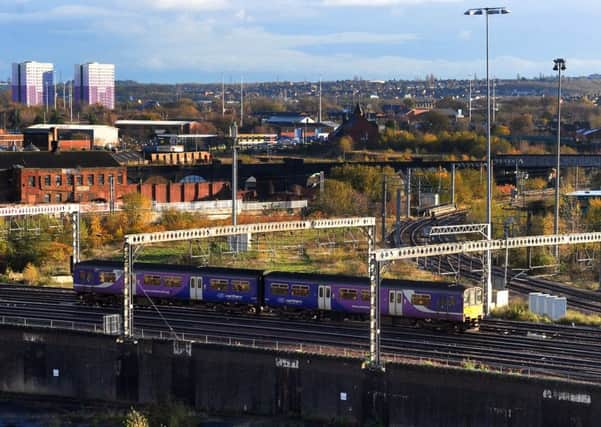David Behrens: Northern Rail. New logos, but same third-world service


Leaves, you will have noted, fall on to other surfaces, too, but only on rail lines, it seems, do they have the capacity to entirely disrupt travel arrangements.
One must assume that the company thought it was being helpful in drawing our attention to this horse chestnut hell. In fact it laid bare the two hollow planks on which Northern Rail’s public relations effort is predicated: patronising and victimising the travellers, and making excuses for not running services instead of finding ways of running them better.
Advertisement
Hide AdAdvertisement
Hide AdIt is 11 years since Northern Rail took up its franchise to run all the local services across and on both sides of the Pennines. That has been time enough - even within the constraints of its contract - to innovate, to improve, to impress.
It has done none of these. It never even tried.
Next month, two years later than planned, the chaotic Department for Transport will name the company that will replace Northern Rail in the spring.
It should be a time to usher in a new start, with different people and higher standards. Instead, it will be an exercise in swapping caps in the engine shed.
One of the three companies on the shortlist – Arriva – had the franchise before Northern Rail and made an even worse fist of it. A second, Govia, runs the services on the Thameslink and London Midland lines, amongst others.
Advertisement
Hide AdAdvertisement
Hide AdNorthern Rail’s co-owner, the European rail operator Abellio, is the third bidder. Its current partner, the all-purpose outsourcer Serco, failed to make the cut.
Whichever of this unholy trinity wins out, the uniforms and logo will change but the third-world service with which we have learned to live will not.
The extent to which this is seen as a given can be gauged by the fact that the RMT union has already told its members that come April they will have a new employer. Automatically. No one will need to prove his worth; the new incumbent will be expected to take everyone on.
In one sense, this is welcome: no one wishes to see loyal and worthy people lose their livelihood. But does that railway cap fit everyone at Northern Rail?
Advertisement
Hide AdAdvertisement
Hide AdIt is the standard rhetoric of the human resources executive that a company’s greatest asset is its staff – but in an industry that still clings to the jobs-for-life culture of pre-privatisation; in which a union card buys, for those who wish it, a licence to behave as they please; and where excellence and creativity are washed away on a tide of mediocrity, the claim rings as hollow as those public relations tweets.
And what will the re-uniformed managers of the new franchisee bring to the party?
The Government wants them to withdraw those sickness-inducing Pacer trains – the so-called buses on wheels brought in by British Rail in its death throes – and replace them with new rolling stock, as well as carry out the “modernisation” of other carriages.
What this might involve – and how little they will be allowed to get away with – is unclear. It is unlikely that air conditioning will be fitted, or that seat reservations, catering or first class compartments – all of them standard issue for most other franchises – will be even considered.
Advertisement
Hide AdAdvertisement
Hide AdAnd how – other than with grants from the taxpayer – will the new operator finance the improvements? It could, as Ministers want, cut staff costs by doing away with the wholly unnecessary practice of insisting that every train carry a conductor as well as a driver. Exactly what these people are supposed to conduct is unclear: depending on their degree of truculence they will either sell you a ticket or fine you for not having bought one already.
Govia operates without conductors on all its Thameslink trains, and Northern could have followed two years ago when its franchise was extended. Instead, and rather than take on the unions, it chose to raise funds by imposing an “afternoon peak time” surcharge. It was the company’s one and only innovation and it was targeted directly against the passengers.
A year ago, I conducted on behalf of this newspaper an online interview with Northern Rail as it tried to launch a charm offensive while the DfT considered its options.
Readers were invited to contribute questions, and nearly all were hostile. Northern Rail was nothing if not consistent: it performed, it said, as the terms of its franchise required it to. Any shortcomings were the responsibility of the Government, Network Rail or the passengers.
Advertisement
Hide AdAdvertisement
Hide AdIts shareholders were presumably content with this: the company handed out £28m in dividends last year while in receipt of well over £100m in subsidies.
For the rest of us, the equation is as unbalanced as the logic. A system in which the operators and the staff expect outdated and self-serving practices to be maintained as of right is exactly what privatisation was supposed to end.
Will the new franchisee restore some balance in the passengers’ favour? The answer, like that pile of leaves, is blowing in the wind.
• David Behrens is a long-suffering Northern Rail passenger. He is also digital editor of The Yorkshire Post.